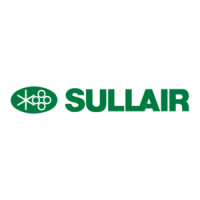4. Inspect and clean the orifice inside the sight glass
blocks. The orifice must be removed with an allen
wrench.
5. Coat/lubricate the O-rings with silicone grease.
6. Reattach the connectors to the sight glass/orifice
blocks.
Pressure Regulator Adjustment
Refer to Figure 6-5. Start the compressor and adjust the
service valve to maintain service air pressure
approximately at 1 psi over rated pressure. Turn the inlet
valve regulator adjusting screw until air just begins to
escape from the control air orifice, located at the bottom
of the regulator. Lock the adjusting screw in place with the
locknut. The regulator is now properly set.
1
2
SU_0000033
1. Locking Nut
2. Adjustment Screw
Figure 6-5: Regulator Adjustment
Water Condensate Drain Maintenance
If your compressor is fitted with the standard solenoid
condensate drain valve, it is necessary to periodically
clean the strainer. Remove the hex cap from the strainer
and remove the strainer screen. Clean the screen and
reinstall. If the screen is damaged, the strainer assembly
must be replaced (P/N 241772).
Control Line Strainer
The regulator and solenoid valve(s), which control the
compressor, are protected by a strainer. Every 12 months
it is necessary to clean the strainer. Remove the hex cap
from the strainer and remove the strainer screen. Clean
the screen and reinstall. If the screen is damaged, the
strainer assembly must be replaced (P/N 241772).
Shaft Coupling Maintenance
The compressor unit and motor are rigidly connected via
a mounting adapter housing. This arrangement makes
coupling alignment unnecessary. The coupling is a jaw
type in shear. If the elastomeric element requires
replacement due to wear or breakage, order replacement
element no. 02250152-670, and follow the following steps:
1. Remove the protective grill from the adapter housing.
2. Loosen the retaining screw located on the outer
sleeve. Slide the sleeve to one side, exposing the
coupling element.
3. Unwrap the coupling element from the coupling jaws.
4. Install the new element by wrapping it around the jaws,
engaging the cogs on the element into the jaws.
5. Reinstall the outer sleeve and the protective grill.
Secure the outer sleeve by tightening the two screws
to 45 in·lbs (5 N·m).
6.9
TROUBLESHOOTING -
INTRODUCTION
The information contained in the Troubleshooting Guide
has been compiled from field report data and factory
experience. It contains symptoms and usual causes for the
described problems. However, DO NOT assume that
these are the only problems that may occur. All available
data concerning a problem should be systematically
analyzed before undertaking any repairs or component
replacement procedures.
A detailed visual inspection is worth performing for almost
all problems and may avoid unnecessary additional
damage to the compressor. Always remember to:
1. Check for loose wiring.
2. Check for damaged piping.
3. Check for parts damaged by heat or an electrical short
circuit, usually apparent by discoloration or a burnt
odor.
Should your problem persist after making the
recommended check, consult your nearest Sullair
representative.
MAINTENANCE
®SULLAIR®
3000-4500 Operator’s Manual and Parts List
65

